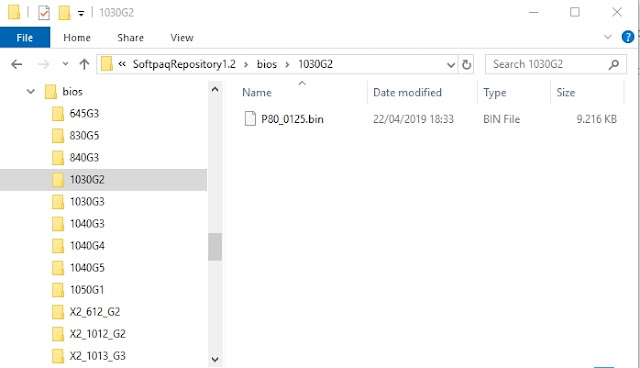first you have to download HP Client Management (Powershell) Script library from https://ftp.hp.com/pub/caps-softpaq/cmit/hp-cmsl.html
after you installed the script , you have to create a folder where you want to save the softpaq.
example I create C:\SoftpackRepository
then I create a folder with the model name of my computer:
md C:\SoftpackRepository\Elitebook_840_G5
cd C:\SoftpackRepository\Elitebook_840_G5
in order to set this folder as a softpaq repository:
Initialize-Repository
it creates a subfolder .repository
now I have to add the model , providing sysID , OS and softpaq catergories I want o download
Add-RepositoryFilter -platform 83B2 -os win10 -osver 1809
or
Add-RepositoryFilter -platform 83B2 -os win10 -osver 1809 -catogory driver
or
Add-RepositoryFilter -platform 83B2 -os win10 -osver 1809 -catogory BIOS
or
Add-RepositoryFilter -platform 83B2 -os win10 -osver 1809 -catogory firmare
(see documentation for categories list , it will change. link https://developers.hp.com/hp-client-management/doc/softpaq-repository )
if you (john.doe@acme.com@acme.com) want to be informed if something goes wrong during softpaq download set these two parameters
Set-RepositoryNotificationConfiguration -server "smtp.acme.com" -username john.doe@acme.com -password "your_passwor" -from "softpaq-repo-sync@acme.com" -fromname "SOFTPAQ REPOSITORY NOTIFICATION"
Add-RepositorySyncFailureRecipient -to john.doe@acme.com@acme.com
these settings are saved in .repository\repository.json file
once the setting is done, just run
Invoke-RepositorySync
if after some weeks you want to update your folder
do these:
cd C:\SoftpackRepository\Elitebook_840_G5
Invoke-RepositorySync
if you want to remove obsolete softpaq or softpaq not matching the filters written in repository.json
cd C:\SoftpackRepository\Elitebook_840_G5
Invoke-RepositoryCleanup
.
you can repeat all steps for several models or read my next post about how to do it in a loop


